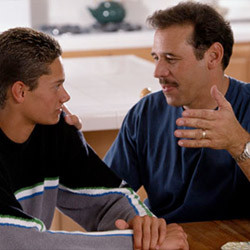 “Summer vacations can wreck havoc with a teen’s mood, but you can help your teen continue to improve mentally by providing goals and activities for the summer.”
“Summer vacations can wreck havoc with a teen’s mood, but you can help your teen continue to improve mentally by providing goals and activities for the summer.”Even if your teen is taking medicine for depression, anxiety, or another mental illness, you can hasten their recovery by making some lifestyle adjustments. The human brain thrives on routine. This is even more critical for someone with mental illness. If your teen is in school, they have an advantage because their day is already regulated for them. One of the best things for our brains is to simply walk outdoors for twenty minutes at the same time each day. The daylight lets our circadian rhythm know that it is daytime, serving as a natural sleep-regulator, and the exercise helps the brain to awaken and sharpen.
Exercise is a great way to boost mood and lower stress. If your teen is trying to decide between physical education and another class, physical education may be a better choice, especially since it does not include homework. If PE isn’t in the cards, an after-school run each day can substitute. A mid-morning snack of fruit or nuts, along with some water, can also keep your teen from mentally slumping. If your teen is on multiple medicines, they may require extra fluids since they can be dehydrating. This can be offset by drinking a large glass of water with the medicine. Some of the psychotropic medicines carry increased risk of overheating or sunburn. It may be too hot for them to exercise outdoors in the summer heat.
Beyond exercise, it is crucial that the teen go to bed at the same time every night. For an hour or two before bed, they should avoid the blue light emitted from glowing television or computer screens, which confuses the brain by making it think it is daylight. Bedtimes and exercise routines often get thrown off on the weekend. As tempting as it is for your teen to sleep in until noon on Saturday, it disrupts the brain’s rhythm. Try to keep the weekend routine as similar to the weekday routine as possible. Your teen may agree to sleep in only one hour later than usual if you promise to make them something special like French toast for breakfast.
Summer vacations can wreck havoc with a teen’s mood, but you can help your teen continue to improve mentally by providing goals and activities for the summer. For example, they may be willing to attend summer school if they knows that they’ll get a study period the following school year. This is a good way to keep them in a healthy routine while also easing the transition back to school.
If summer school is not an option, have your teen set some goals for the summer so that they have some structure, such as volunteering or learning a new instrument that requires daily practice. Ask them to set up a schedule for these activities and agree to a time for waking and bedtime, even if it is later than the school year routine. As long as they keep to a routine, they’ll be okay, and they can slowly transition back a week or two before school resumes. Have them perform the exercise of their choice at least once a day for 40 minutes to an hour. At a minimum, they can walk the dog each morning and each evening, but establish a set time for the walks. They can make their afternoons unstructured for relaxation. The key is to maintain as close a schedule as possible.
 “It is common for siblings to blame themselves for causing the problem.”
“It is common for siblings to blame themselves for causing the problem.”